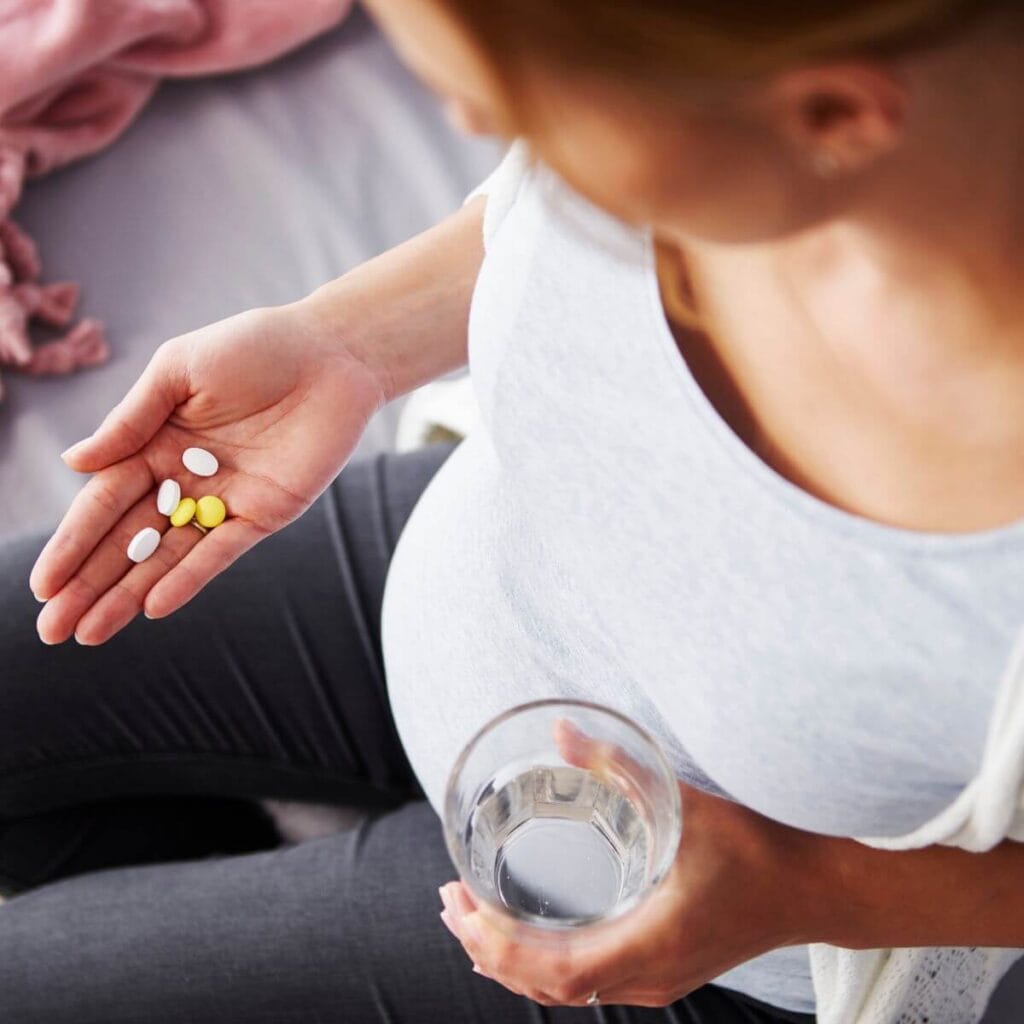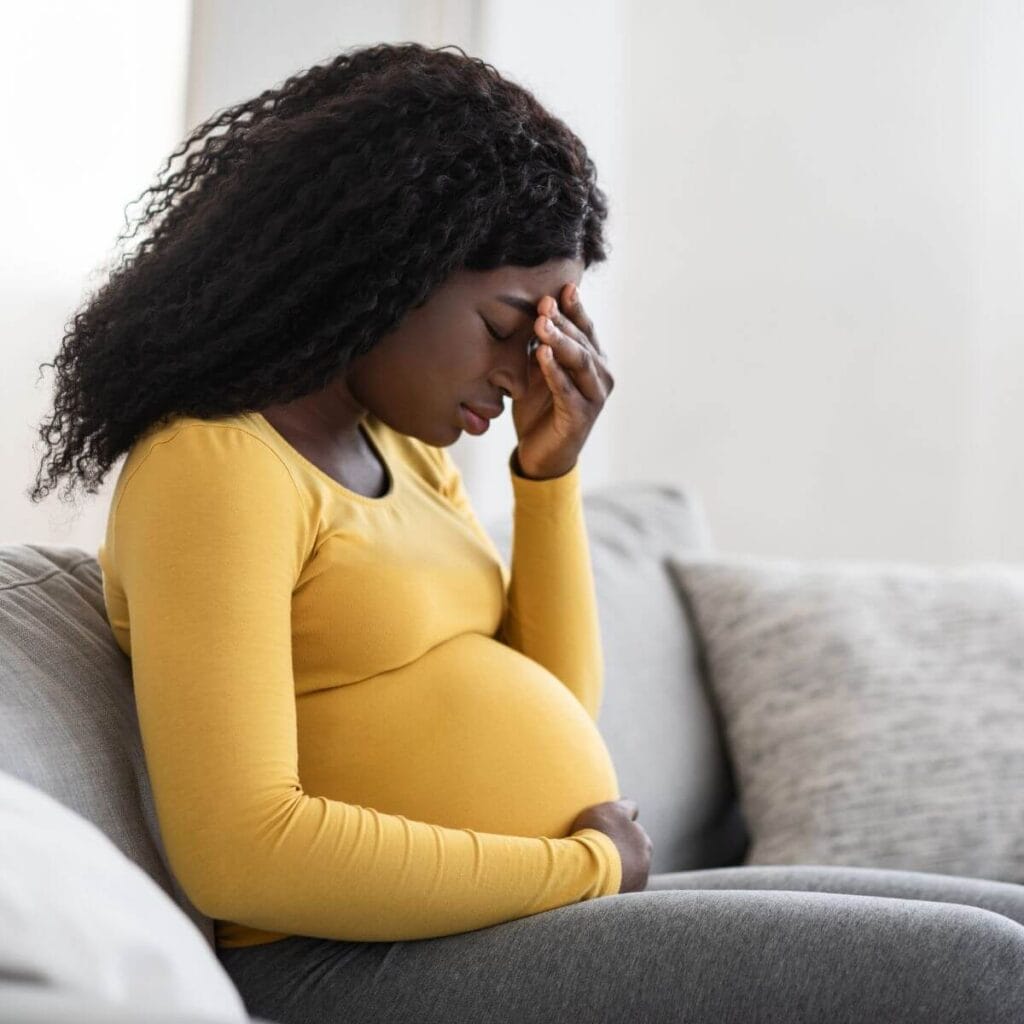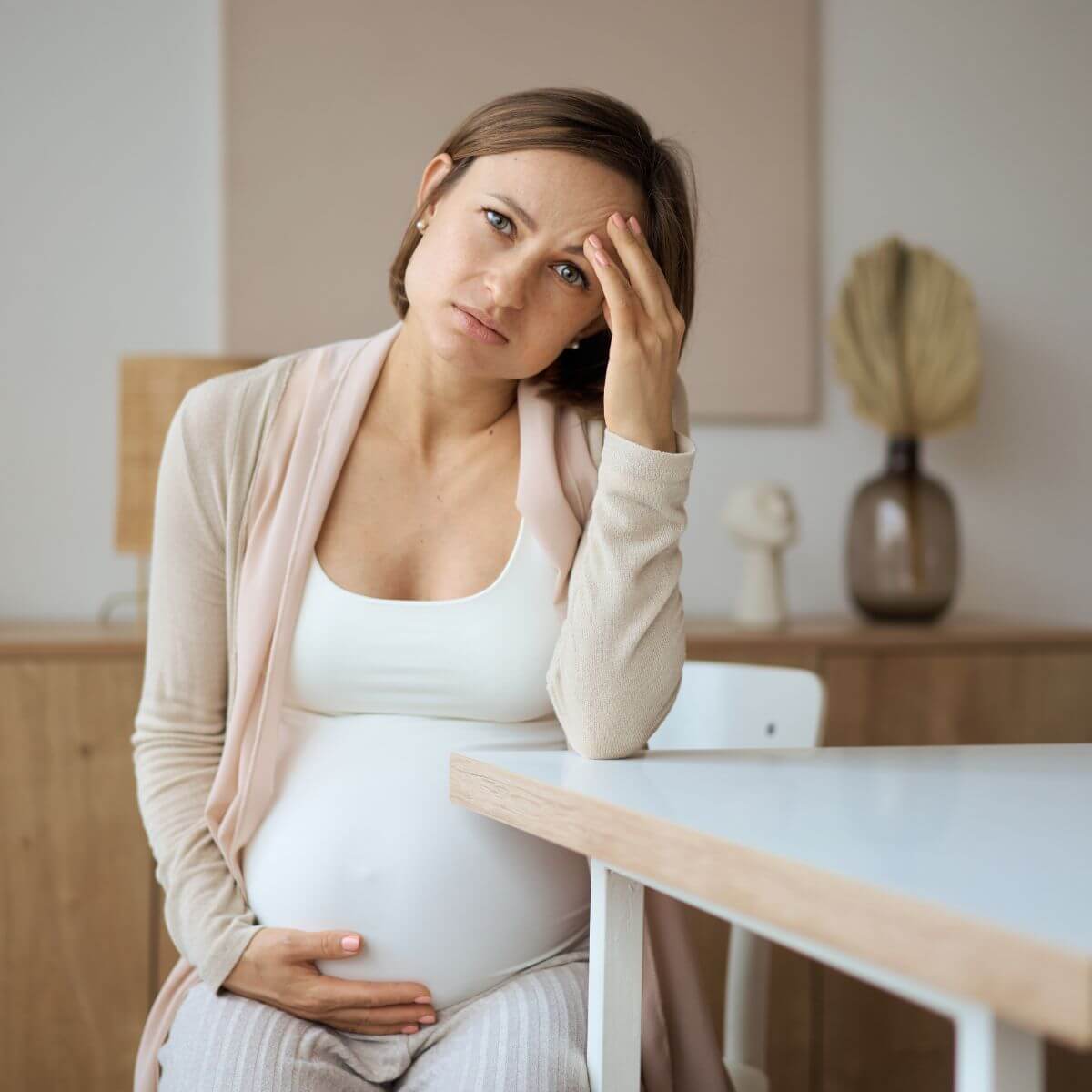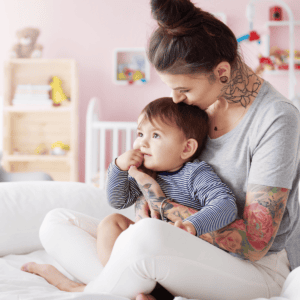I have a strong history of anxiety, but when I was pregnant with my son Jack, I wasn’t medicated for it. I lost 4 pregnancies before Jack was born and, quite frankly, I was terrified to do anything while he was inside my body–speed bumps scared me; the idea of drinking a cup of coffee felt akin to seeing Bigfoot running toward me in the woods; and I sure as hell wasn’t going to put any medication in my body–even though I had relentlessly googled “safe antidepressants in pregnancy.”
And friend, I cannot emphasize enough the enormity of that mistake. Here’s what I want you to know before I continue this story. There ARE safe antidepressants you can take during pregnancy, as well as many safe ways to treat other mental health concerns.
While some old-school doctors still say to avoid any medication you can while pregnant, those current on psychotropic research will tell you that a downturn in mama’s mental health poses a much greater risk than a mental health medication and that safe antidepressants in pregnancy are more helpful than stopping medication for your mental health.
It breaks my heart that I once played into the stigma against treating mental health concerns, particularly for women during pregnancy. And let me tell you how it turned out for me.
I spent my entire pregnancy with Jack crippled by anxiety, which is actually a fairly normal response to pregnancy after miscarriage. But this was not an acceptable level of anxiety; it was debilitating.
I was only 3 days postpartum when the world around me physically looked dark, as if I were seeing everything through dark gray lenses. My anxiety levels were through-the-roof, constant panic attacks, collapsing into puddles of tears, and not understanding how parents enjoyed or looked forward to anything. Ever.
I could have helped myself, but I chose not to. And that’s heartbreaking.
- Seeing a Perinatal Psychiatrist
- Trying Again after PPA and PPD
- Does Depression or Anxiety Get Worse or Better During Pregnancy?
- Signs of Depression or Anxiety in Pregnancy
- Should You Stop Taking Antidepressants When You Get Pregnant?
- I Stayed on Antidepressants During My Second Pregnancy
- Which Drugs are Considered Safe Antidepressants in Pregnancy?
- Switching to New Safe Antidepressants in Pregnancy–How Does it Work?
- Are There Times When It’s Okay to Stop Taking Antidepressants During Pregnancy?
- Can You Start Taking Anxiety and Depression Meds While Pregnant?
- Natural Ways to Improve Your Mental Health During Pregnancy
- Do Yourself a Favor: Ask for Mental Health Advice During Pregnancy
Seeing a Perinatal Psychiatrist
About 48 hours after Jack was born, I rapidly spiraled into a deep state of postpartum anxiety and depression. It was so bad that it severely impacted my first 2.5 years of motherhood for me.
I had always wanted two kids, but for years after Jack was born, I couldn’t fathom the idea of ever having another baby. And while my fertility struggles certainly played a role in that, my fears mostly centered around my own mental health.
I could not go through two more years of the misery I lived in after Jack was born.
When I was postpartum with Jack, I began seeing a perinatal psychiatrist. Originally, she helped me navigate medicating PPA and PPD while breastfeeding. But later, I learned something from her that shocked me.
She told me that, if I wanted to have another baby, I could decrease my risk of a repeat experience with postpartum anxiety and depression by taking safe antidepressants in pregnancy.
And that, friend, felt like the answer to a prayer I had feared to even pray.
Trying Again after PPA and PPD
Being armed with this information was the tipping point that allowed me to decide to try to conceive again. 4 ½ years after Jack was born, I brought home another baby, a daughter named Branham.
I held my breath and clenched my jaw as we rode down the elevator in the hospital–the same ride that felt like it had plummeted me straight into postpartum anxiety with Jack.
And all I felt was joy.
I cannot guarantee that the reason my mental health was better after Branham’s birth was due to medication. In fact, my perinatal psychiatrist and I had put many different systems in place to decrease my risk of repeat PPA and PPD.
But I do believe the medication played an essential role, among all the other therapy and planning we were doing. And I will go to the end of the earth to advocate for mamas who need resources like medication to understand the truth behind the safety of antidepressants in pregnancy.
Please note that this article is not intended to diagnose or treat any mental illness; nor does it provide medical advice. Please make all medical decisions in conjunction with your medical provider. Read our full disclaimer here.
Does Depression or Anxiety Get Worse or Better During Pregnancy?
According to researchers in the fields of psychiatry and neuroscience, “Pregnancy is a time of increased vulnerability for the development of anxiety and depression.”
With pregnancy not only comes massive physiological and hormonal changes; it also comes with “substantial changes in brain structure,” a shift in a pregnant person’s own self-identity, and a new level of societal pressures not experienced prior to pregnancy.
It’s for so many of these reasons that mental health disorders can often start, return, or worsen while pregnant.
That’s why we beg of you to please take care of your own mental health during pregnancy. Societal expectations for pregnant people to be so overflowing with joy that they have “glow” often leads to feelings of guilt, shame, and isolation when expecting moms struggle.
But emotional struggles during pregnancy are common and understandable, and if those struggles are severe enough to warrant a doctor’s visit or medication, that’s often considered to be the healthiest choice you can make for yourself or your baby. (More on that later).
If you have a personal or family history of depression or other mental health conditions, it’s vitally important to tune into your thoughts and emotions and be on the lookout for any potential signs of extra anxiety or depression while pregnant.
Signs of Depression or Anxiety in Pregnancy
If you notice any signs of depression or anxiety, like the ones listed below, please make an appointment with your doctor as soon as possible:
- Depressed moods for most of the day, several days a week
- Feelings of guilt, hopelessness, or worthlessness
- Thoughts of death or suicide
- Having a hard time thinking and focusing
- Loss of interest in hobbies, relationships, and other daily activities
- Feelings of worry or panic
- Troubles with sleep, i.e., fatigue, insomnia, etc.
- Loss of appetite
- Irritability
- Low Sex Drive


This site contains affiliate links, meaning that we earn a small commission for purchases made through our site. We only recommend products we personally use, love, or have thoroughly vetted.
Should You Stop Taking Antidepressants When You Get Pregnant?
We pee on a stick, place it on the counter, and await the results. As soon as the test turns positive, it’s like a switch goes off inside our brains.
We become sharply aware of everything we “should” and “shouldn’t” do for the next nine months. No more alcohol, deli meat, fish high in mercury, or soft cheeses allowed.
I sometimes hear moms reminded of one sage piece of advice: “Stop shoulding all over yourself.” And if antidepressants or other mental health medications are supportive for you, then they very much are on the list of things you need not “should” about.
I don’t care what your mom, sister, best friend, or great aunt Gertrude say–whether you remain on medication during pregnancy is a decision between you and your medical care provider(s), and no one else.
Evidence-Based Research in Favor of Safe Antidepressants in Pregnancy
A study published in the Journal of the American Medical Association (JAMA) in 2022 found that “antidepressant use during pregnancy does not increase the risk of neurodevelopmental disorders in children.” And while antidepressant use doesn’t pose a risk to children, exposure to maternal stress or depression actually does.
In fact, a 2021 review of 20 different studies found that untreated “maternal depression during pregnancy” leads to an increased risk of the following adverse outcomes for babies:
- Preterm birth
- Small for gestational age
- Stillbirth
- Low birth weight
Maternal depression during pregnancy was also associated with an increased risk of perinatal complications, increased c-section rate, and postpartum depression.
Additional research published in the British Journal of Psychiatry found that children who were exposed to maternal stress during gestation were 3 times more likely to develop a personality disorder, compared with those who were unexposed. The risk for children exposed to what researchers deemed “severe stress” increased sevenfold over unexposed children.
And in terms of children’s executive functioning skills as they develop through childhood–it appears there’s a connection there, as well.
A 6-year longitudinal study published in 2019 found that higher levels of maternal depressive symptoms were associated with poorer executive functioning skills in children by age 6.
This study suggested postnatal maternal depressive symptoms also had a strong impact on children’s development of executive functioning skills, reiterating the importance of postpartum mental health, as well.
Here’s the TL;DR version of all this. Research suggests that there is no negative impact to babies from taking safe antidepressants during pregnancy, but there are many negative outcomes that last for years, if not a lifetime, associated with exposing children to untreated maternal depression during pregnancy and after birth.
And that doesn’t even account for the maternal impact.
Guilt and Safe Antidepressants in Pregnancy
So in hindsight, do I think I made a good decision being too scared to take my medication during pregnancy with Jack? Quite the opposite.
While I don’t blame myself and refuse to feel guilty for that choice–I was working from the best information I had available at the time–I feel certain that I did us both more harm than good.
That said, I also want you to know this, mama. If you’re reading this, and you’re feeling guilty for not medicating during pregnancy or postpartum, please don’t.
We’re working against intense societal pressures and we’re all doing our best. And while I would change my decision if I could go back and repeat it, Jack still grew into an amazing, brilliant, empathetic, big-hearted little boy, and we have not only a healthy but a delightful attachment to one another.
I want to spread this information to help us make better decisions for ourselves and our children in the future. But please, PLEASE do not fall into the trap of feeling guilty because of what you’re learning. That doesn’t serve anyone.
I Stayed on Antidepressants During My Second Pregnancy
When postpartum anxiety hit after Jack was born, I was prescribed Zoloft, and within 4 weeks, I began to see the world in its actual color again.
Although it took 2 ½ years for my mental health to feel back to its baseline, the impact of medication was significant and rapid (though 3-4 weeks admittedly did not feel “quick” at the time).
In fact, let me tell you how significant the change was. I grew up in a small town in Georgia in the 80s and 90s–mental health was not something anyone understood. My parents still live there, and despite having watched me struggle with anxiety my whole life, my daddy still doesn’t really “get” mental health struggles. He knows they’re real, but he doesn’t understand them, and he doesn’t understand how the medication works.
But when Jack was right at 6 weeks old, my parents were over for dinner, as they often were during this time. My mom practically lived with us in these early anxious weeks because I could not function through the anxiety to care for Jack alone.
Hell, I couldn’t even care for myself.
My Dad’s Realization: Maternal Mental Health MATTERS
We were all gathered at the dinner table, Jack sleeping on my mom’s shoulder, Daddy, Husband, and I chatting and laughing. In the middle of my laughter, my dad stopped, got very serious, and said to me, “Katy, I don’t understand this medicine you’re on or how it works, but it’s the damnedest thing I’ve ever seen.”
For those who aren’t fluent in Southern speak, he was stunned by how effective the antidepressants were.
I was a completely different person than just a few short weeks before, he told me, and he couldn’t express the relief he felt–or the fear he’d experienced as he’d had to watch me struggle so desperately before.
Because antidepressants and anxiety medications weren’t new to me, I knew what worked best, so when I finished breastfeeding Jack, I switched from Zoloft to Lexapro, my preferred SSRI. Then, I added Xanax XR to help further control my anxiety. This is when I finally started to feel like myself again.
Preparing for Another Pregnancy
Before getting pregnant with Branham, I’d already been in touch with my entire medical team, and everyone agreed that I would continue Lexapro throughout that pregnancy.
I weaned off Xanax XR (time-release Xanax) before trying to conceive, but when I told my perinatologist I’d done that, she said she’d have actually supported me staying on that, as well.
Because she’s up on the research, and she knows how important it is for maternal mental health to be cared for during pregnancy. And friend, if you find yourself with a doctor who isn’t supportive of that, I beg of you, please talk to someone more specialized before making any final decisions.
Here’s the thing about doctors: most doctors specialize in something very specific, and outside of that specialty, they aren’t keeping up with all the latest research.
And if their specialty is more generalized, like primary care, they cannot possibly keep up with all the research about everything, so they rely on specialists to help their patients make informed specialized choices.
So if your PCP, or heck, even your OB, says a medication is a no-no, consider whether there might be someone who’s more up-to-date on maternal mental health.
The answer still might be that the medication isn’t a best fit, but isn’t it better to get that information from someone who’s staying on top of the research?
When it comes to mental health medication during pregnancy, the most specialized doctors will likely be perinatal psychiatrists and perinatologist/maternal-fetal medicine specialists (MFMs).
Which Drugs are Considered Safe Antidepressants in Pregnancy?
Let’s say you’ve talked to a specialist and decided to stay on your antidepressant, or start a new safer one for pregnancy. Now you need to decide which one is safest for you and go from there.
Since 1979, healthcare professionals have categorized medications and their safety during pregnancy. These categories assess risk levels and the possibility of congenital disabilities. They’re broken down as follows:
- Category A: Studies show no risk to pregnant individuals or babies
- Category B: These medications showed no risk to fetuses in animal studies but lacked in-depth human research.
- Category C: Another lack in human studies, but animal studies show possible risks to babies. Often, however, the benefits of the medication outweigh the risks.
- Category D: Studies on pregnant people show a risk to babies, but the advantages might still outweigh the risks.
- Category X: Studies show significant risks of abnormalities in babies. In this case, the benefits of taking them DON’T outweigh the risk factors.
“Antidepressant” is an umbrella term for a class of medication used to treat various mood or behavioral disorders. Just because they all work to help us overcome similar problems, doesn’t mean they’re the same.
There are different categories of antidepressants. They each have different modalities of effectiveness, as well as different ratings in terms of safety during pregnancy and breastfeeding.
1. SSRIs and SNRIs
The most common types of antidepressants are Selective Serotonin Reuptake Inhibitors (SSRI) and Norepinephrine Reuptake Inhibitors (SNRI). Typically, medicines like these fall under Category C, meaning there’s a minimal possibility of risk.
However, most doctors still feel confident prescribing them because of all the adverse outcomes we’ve discussed about leaving depression or anxiety untreated.
Some frequently prescribed SSRIs and SNRIs include:
- Citalopram (Celexa)
- Sertraline (Zoloft)
- Venlafaxine (Effexor XR)
- Duloxetine (Cymbalta)
- Fluoxetine (Prozac)
- Escitalopram (Lexapro)
All are considered equally safe during pregnancy. And for clarity’s sake, this is the drug class I took both while breastfeeding Jack and while pregnant with and while breastfeeding Branham.
While long-term risks to babies have largely been disproven, it is possible for babies exposed to SSRIs during pregnancy to be born with neonatal adaptation syndrome. This condition can cause jitters, irritability, and possible breathing trouble. Experts aren’t sure if this is due to withdrawal symptoms or exposure in utero, but neonatal adaptation syndrome is only temporary.
Please note, however, that one SSRI drug, paroxetine (Paxil), is listed as a category D medication. Research shows a small but proven risk of heart defects and cardiac malformations when taken during the first trimester.
2. Buproprion
Bupropion (Wellbutrin), a dopamine reuptake inhibitor, is another medicine used to treat depression. It’s listed as a Category B drug and is considered relatively safe for pregnant women.
However, it’s not a first-line treatment, so it’s not as widely used. Most practitioners will only prescribe bupropion if preferred medications, like SSRIs or SNRIs, don’t work.
3. Tricyclic Antidepressants
Tricyclic antidepressants (TCA) may be okay if the advantages outweigh possible risk factors. However, studies show a possible connection between these medications and miscarriage and congenital defects.
If you’re taking a TCA or considering one, ask your doctor for more information, as it is generally not considered one of the safe antidepressants in pregnancy.
4. Benzodiazepines
Doctors often prescribe benzodiazepines (Valium, Xanax, Ativan) to help alleviate anxiety. It’s worth noting, however, that when using this Class D medication during pregnancy, there’s a small risk of congenital defects.
It’s also possible for your little one to experience withdrawal symptoms, breathing issues, and feeding troubles when using these medications in the third trimester.
It doesn’t seem like there’s significant usage of benzodiazepines among expectant mothers, though. Per the CDC, fewer than 1 in 100 pregnant people take them while pregnant.
5. Valproic Acid
Labeled a Category D medication by the FDA, Valproic Acid is technically an anti-seizure drug, but it’s often used to help treat bipolar disorder. Unfortunately, this treatment comes with significant risk factors for pregnant people.
Data shows 10.73% of children exposed to valproic acid during pregnancy will have some type of congenital defect, such as a cleft lip, spina bifida, or limb malformations. Up to 40% of kids will have cognitive disabilities as they age.
If you have bipolar disorder, speaking with your healthcare provider about your treatment options is crucial. They may have an alternative solution that poses less risks.
Switching to New Safe Antidepressants in Pregnancy–How Does it Work?
Since not all medications are considered equally safe, it is possible you and your doctor will determine together that changing to a new medication is the best route for pregnancy.
There are four standard techniques for changing antidepressants. Your doctor will decide which path is best for you based on your needs, what you’re currently taking, and what you’ll start next. These protocols are:
- Direct Switch: You’ll stop taking your current medication and immediately begin the new one without tapering or waiting.
- Taper and Switch Immediately: You’ll slowly wean off your current antidepressant. You’ll immediately start the new medicine as soon as you’ve stopped taking it entirely.
- Taper and Switch with a Washout Period: After weaning off your medication, you’ll go through a “washout period” of 2-5 days before starting the new drug.
- Cross-Tapering: While weaning off your antidepressant, you’ll slowly start taking the new medication in incremental doses.
What Happens If You Stop Antidepressants Cold Turkey?
It’s best to wean off any medication you’ve taken long-term gradually (under one of the standard techniques for switching mentioned above) and under a doctor’s supervision. Cold turkey weaning could lead to antidepressant discontinuation syndrome.
Or, in other words, withdrawal. This can cause anxiety, fatigue, return of depression symptoms, flu-like symptoms, nausea, headaches, and more.

Are There Times When It’s Okay to Stop Taking Antidepressants During Pregnancy?
Let me repeat what I said earlier: never go cold turkey on your antidepressant, and never do it without your doctor’s approval and awareness.
If your depression is situational rather than clinical, or if your doctor thinks it’s safe for you to wean off, there’s a chance your physician might suggest stopping treatment during pregnancy.
Instead, they might recommend treating your symptoms with counseling and natural solutions until your baby is born. We always recommend combining the use of psychiatric medication with therapy or counseling.
Just remember that this is a decision to make in conjunction with your medical care team, not on your own.
Can You Start Taking Anxiety and Depression Meds While Pregnant?
If you develop symptoms of depression or anxiety during pregnancy, or if your previously existing symptoms worsen, your doctor might suggest starting medication.
It all depends on your situation.
Not every mood disorder or circumstance requires antidepressant use. If your physician feels you can overcome your symptoms without psychopharmaceuticals, they might encourage that route.
That said, always be your best advocate and let them know if you feel like this isn’t enough. Many pregnant people often report struggling to report mental health symptoms to their doctors for fear of sounding like they’re complaining, sounding “whiny,” or being dismissed.
And while it’s unfortunate that cultural precedent has led us to develop such fears, it still remains that you cannot get treatment if you don’t make it clear to your doctor why you believe you need it.
So please don’t be shy about reporting your struggles. Mental health conditions are very real, and it is a medical doctor’s responsibility to help you treat them.
Natural Ways to Improve Your Mental Health During Pregnancy
Whether you’re taking medication or not, we always recommend working to improve your mental health through non-pharmacological means, as well.
It doesn’t have to be either/or. Whether you and your care team feel you need antidepressants or not, there are still ways you can actively support your mental health during pregnancy.
Ways to Support Mental Health Struggles Naturally
The following suggestions are great techniques for overcoming mental health conditions without medication:
- Find a Therapist or Counselor: Therapy and counseling are excellent treatment options for anyone suffering from anxiety or depression during pregnancy. You can even find online counseling services if you feel more comfortable taking that route.
- Stay Active: Excuse my language momentarily; I will share one of my friends’ reminders when my anxiety is on a downward spiral. They tell me to “go take my fucking mental health walk.” It might sound silly, but gentle exercise and motion are proven to help with depression and anxiety symptoms.
- Journal: While journaling might not be for everyone (I can’t ever stick to it!), it’s an excellent treatment alternative that takes little time, money, or effort.
- Support Groups: Many areas offer support groups where you can chat with other individuals experiencing the same things as you. The Substance Abuse and Mental Health Services Organization Administration (SAMHSA) has plenty of resources to help you find one.
- Rest: Do your best to get plenty of rest during pregnancy and avoid “overdoing” things. Remaining gentle with yourself can help you overcome your negative feelings.
You can also ask your healthcare provider for other ways to treat your mental health conditions without getting a prescription if you and those close to you believe this to be a good option for you. There are plenty of suggestions they may have.
Undefining Motherhood’s Worry-Free Pregnancy Guide
And a bit more good news, mama, is that we also have a resource for you. After years in therapy during my fertility, pregnancy, and postpartum journeys, I created a resource full of all the tools and exercises that supported me along the way.
I even showed them to my psychiatrist to make sure I had all the details right.
I call it the Worry-Free Pregnancy Guide (though I can’t actually promise you’ll have zero worries.) It’s not meant to replace therapy (I am not that kind of doctor!), but it is an amazing resource that’s supported so many mamas in conjunction with all their other important efforts!
Grab Your Free Worry-Free Pregnancy Guide Now!
Do Yourself a Favor: Ask for Mental Health Advice During Pregnancy
You’re pregnant and preparing to start or expand your family. This should be one of the most thrilling moments of your life. You should be blissed out by the excitement and focused on nothing but choosing a baby name and picking out your maternity shoot outfit.
At least that’s what “they” say…right?
Here’s the truth of the matter: If you’re one of the 1-in-5 women diagnosed with a mental health condition in the United States, those troubles don’t usually disappear after you pee on a stick.
And even if you aren’t one of those women, pregnancy is not often a cakewalk.
It’s okay if it feels hard, if you don’t like it, and if you struggle.
I am begging you– if you’re worried about how your mental health will affect you during pregnancy, please seek advice from a professional. Whether you continue taking safe antidepressants in pregnancy, switch to a new medication, or try natural alternatives, find the help you want, need, and deserve.
Yes, growing a baby is a huge responsibility, but don’t lose sight of how much you matter too, mama.
There’s no need to suffer during pregnancy without treatment for your depression or anxiety. Your doctor can recommend plenty of safe, healthy options to help guide you through these next nine months.
Is finding safe antidepressants in pregnancy something you’re worried about? What advice has your doctor given?










